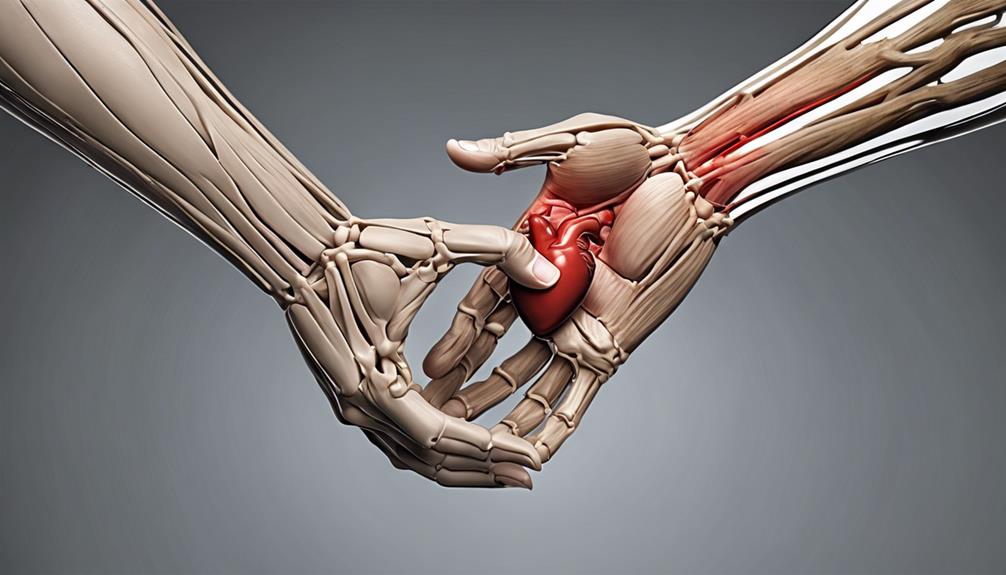When delving into the complex connection among **hypertension**, **heart disease**, and **stroke**, it’s like unraveling the layers of an onion to grasp just how closely linked these **cardiovascular** issues really are. Each one affects the other significantly, highlighting their strong interdependence. If you’re curious about how these conditions interact and impact each other, keep reading to uncover the hidden details.
As we explore the intricate web of connections between hypertension, heart disease, and stroke, we begin to unravel the complexities that bind them together, shedding light on the crucial importance of understanding these relationships for better cardiovascular health.
Key Takeaways
- Hypertension damages arteries, increasing heart attack and stroke risk.
- Shared risk factors emphasize holistic management of cardiovascular health.
- Understanding common pathways aids in comprehensive prevention strategies.
- Lifestyle changes and medications are crucial in reducing cardiovascular complications.
The Relationship Between Hypertension and Heart Disease
The correlation between hypertension and heart disease is a well-established medical phenomenon, with high blood pressure posing a significant risk factor for various cardiovascular complications. When blood pressure is consistently elevated, it puts extra strain on the heart as it works harder to pump blood through the arteries. This increased pressure can damage the inner walls of the arteries, making them more susceptible to plaque buildup.
Over time, this plaque accumulation can narrow the arteries, leading to a condition known as coronary artery disease. Symptoms of high blood pressure, such as chest pain, shortness of breath, and fatigue, shouldn't be ignored as they may indicate underlying heart issues. If left untreated, hypertension can significantly increase the risk of heart attack, heart failure, and other cardiovascular events.
Therefore, managing blood pressure levels through lifestyle changes and medications is crucial in preventing the development of heart disease and its associated complications.
Impact of Heart Disease on Stroke Risk

Exploring the connection between heart disease and stroke reveals a significant increase in stroke risk for individuals with underlying heart conditions, underscoring the critical interplay between these cardiovascular disorders. When heart disease is present, the risk of stroke is heightened due to compromised blood flow and vessel damage. This connection is crucial as one-third of stroke patients have underlying heart conditions. Shared risk factors between heart disease and stroke, such as high blood pressure, highlight the necessity of managing cardiovascular health effectively. Moreover, a history of heart disease can lead to complications like heart attacks or heart failure post-stroke, further emphasizing the importance of preventive measures. Lifestyle changes and medication adherence aimed at combating heart disease not only benefit the heart but also contribute to reducing the risk of stroke. Implementing strategies to enhance cardiovascular health can significantly mitigate the likelihood of stroke occurrence in individuals with heart disease.
| Risk Factors | Complications | Prevention |
|---|---|---|
| High blood pressure | Heart attacks | Lifestyle changes |
| Vessel damage | Heart failure | Medication adherence |
Effects of Hypertension on Stroke Development
Understanding the intricate relationship between hypertension and stroke development necessitates a comprehensive examination of how elevated blood pressure impacts vascular health and brain function. When exploring the effects of hypertension on stroke development, several key points emerge:
- Artery Damage: Hypertension can cause damage to the arteries, making them more susceptible to tears and ruptures, which can lead to stroke.
- Plaque Accumulation: High blood pressure is associated with the accumulation of plaque in the arteries, further increasing the risk of stroke due to potential blockages.
- Stroke Types: Individuals with hypertension are at a higher risk of both ischemic and hemorrhagic strokes, as the increased pressure can strain and weaken blood vessels, making them more prone to rupture or blockage.
To mitigate the risk of stroke in hypertensive individuals, it's essential to manage blood pressure effectively through lifestyle modifications and medications. By addressing hypertension proactively, the likelihood of stroke development can be significantly reduced, emphasizing the importance of early intervention and preventive measures.
Common Pathways Among Hypertension, Heart Disease, and Stroke

Examining the interconnected pathways linking hypertension, heart disease, and stroke reveals a complex web of cardiovascular implications that underscore the critical importance of holistic management strategies.
Hypertension plays a pivotal role in the development of heart disease by damaging arteries and promoting plaque formation, increasing the likelihood of heart attacks and heart failure. The arterial damage caused by hypertension can lead to blockages, reducing blood flow to the heart and brain, consequently elevating the risk of strokes.
Furthermore, heart disease can further exacerbate the risk of stroke by disrupting proper blood flow to the brain, with a significant portion of stroke patients having underlying heart conditions. Understanding these shared pathways highlights the intricate relationship between hypertension, heart disease, and stroke, emphasizing the need for comprehensive prevention strategies.
Strategies for Preventing Cardiovascular Complications
To prevent cardiovascular complications, implementing a combination of lifestyle modifications and regular health monitoring is essential. Here are three key strategies for preventing cardiovascular issues:
- Maintain a Healthy Diet: Consuming a diet rich in fruits, vegetables, whole grains, lean proteins, and healthy fats can help manage cholesterol levels and blood pressure, reducing the risk of heart disease and stroke.
- Engage in Regular Physical Activity: Regular exercise, such as brisk walking, cycling, or swimming, can improve heart health, lower blood pressure, and maintain a healthy weight, all of which contribute to reducing the risk of cardiovascular complications.
- Monitor Blood Pressure: Regular blood pressure monitoring is crucial for detecting any fluctuations early on. High blood pressure is a significant risk factor for heart disease and stroke, so keeping it in check is vital for overall cardiovascular health.
Frequently Asked Questions
How Is Hypertension Heart Disease and Stroke Are Related?
When we consider hypertension, heart disease, and stroke, we see a complex interplay among these conditions.
Hypertension can damage arteries, increasing the risk of heart disease through plaque buildup. High blood pressure from hypertension can also lead to strokes by affecting blood flow to the brain.
Heart disease can further elevate the risk of stroke due to disrupted blood flow.
These intertwined connections underscore the importance of managing hypertension to prevent serious heart and brain complications.
How Are Hypertension Heart Disease and Stroke Related Abcd?
When examining how hypertension, heart disease, and stroke are related, it's crucial to understand the intricate connection between these cardiovascular conditions.
Hypertension, as a significant risk factor, can lead to arterial damage, plaque buildup, and potential blockages, increasing the likelihood of heart disease and strokes.
Managing hypertension is key in preventing the development of these conditions, underscoring the interplay between them and the importance of proactive health management.
How Is Hypertension Related to Heart Disease?
When high blood pressure, known as hypertension, goes unchecked, it damages arteries, increasing the risk of heart disease. This damage can lead to plaque buildup, causing blockages that may result in conditions like coronary artery disease, heart attack, and heart failure.
Taking steps to manage hypertension through lifestyle changes, medications, and regular monitoring is crucial in preventing these heart complications and reducing associated risks.
How Are Heart Disease and Stroke Related?
When considering the relationship between heart disease and stroke, it's essential to recognize that disrupted blood flow to the brain plays a significant role in both conditions.
This interruption in blood supply is a common factor in many stroke cases and can also contribute to the development of heart disease.
Understanding how these two conditions are interconnected can help us better address prevention and management strategies to reduce the risk of both heart disease and stroke.
Conclusion
In conclusion, the intricate relationship between hypertension, heart disease, and stroke underscores the critical importance of managing high blood pressure for overall cardiovascular health.
The impact of these interconnected conditions can't be overstated, as they create a complex web of risk factors that can lead to devastating outcomes.
By prioritizing prevention and treatment strategies, individuals can navigate the treacherous waters of cardiovascular disease with a heightened sense of awareness and control.









